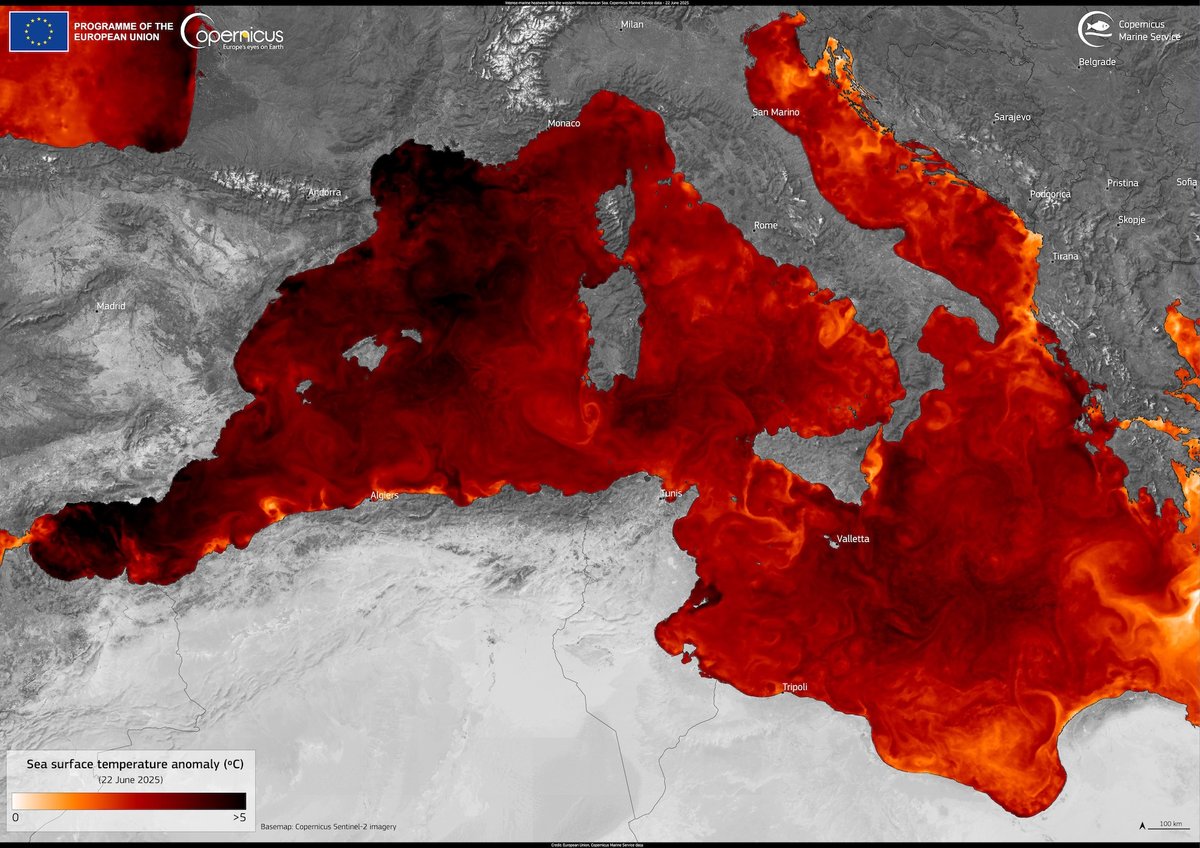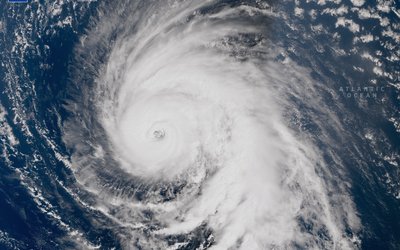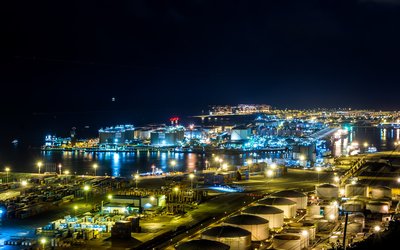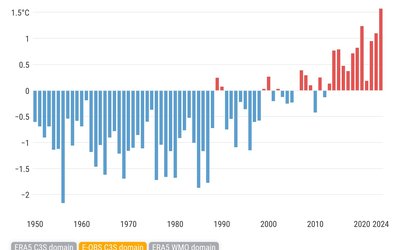
Illustration: By the end of June, the water of the western Mediterranean Sea was already more than 5°C warmer than normal in summer (Credit: European Union, Copernicus Sentinel-2 imagery).
The water of the Mediterranean Sea is extremely warm, and summer has just begun. This is not only bad news for marine life – these heatwaves can turn into mass mortality events – but it may also lead to natural disasters. The deadly floods in Spain last year, where over 200 people lost their lives, was partly due to the warm water of the Mediterranean Sea. With an intense marine heatwave hitting the western Mediterranean Sea, one wonders what the coming months could bring.
Marine heatwaves
As with the heatwaves on land, we can define heatwaves in seawater as a number of consecutive days on which the temperature is above a critical value. Until recently they were an exception, observed in the Mediterranean Sea for the first time in the summer of 2003, when for more than a month the seawater was 2°C to 3°C warmer than normal in summer. In 2003, 2006 and 2008, heatwaves in the Mediterranean Sea led to mass mortality events. These events seem to have become a regular phenomenon; extreme marine heatwaves also occurred in the Mediterranean Sea in the summers of 2018, 2022 and 2024. This year, the situation is even worse, with water temperatures in the western part of the sea more than 5°C warmer than normal in summer. We can expect temperatures to rise even further in the coming months.
Bad news for marine life
The ecosystems in the Mediterranean Sea are vulnerable. The sea is relatively small and only connected to the Atlantic Ocean by the narrow opening of the Strait of Gibraltar. Climate change can rapidly lead to considerable changes in its biodiversity, not only through the warming of the seawater, which will allow tropical marine animals to quickly expand their range and colonise the sea within decades, but also because more of the seawater will evaporate while at the same time less river water flows into the sea, causing it to become more saline. This salinisation is already happening. The increase in the number of marine heatwaves as the climate warms is also a worrying trend. Calculations show that these heatwaves will become more extreme and last for longer. It looks like the marine heatwave of 2003 has already become the new normal today.
Food for floods
Tropical cyclones do not occur in Europe — for now, that is. Still, the Mediterranean Sea is home to another kind of cyclone called a ‘medicane’, a portmanteau of the words ‘Mediterranean’ and ‘hurricane’. These can evolve from storms that form over the warm waters in that region. Italy in particular has had to brave many medicanes in the past. Now that the waters of the Mediterranean are becoming warmer during the summer, the formation of medicanes will obviously also be affected. Experts expect that they will be stronger when they do form and start resembling tropical cyclones, with higher wind velocities, more rainfall and a greater chance of flooding.
It doesn’t look good
Apparently, the Mediterranean Sea has not cooled down this winter. With a warm start the water can get warmer than the year before. The warmer the water the more worrying. And if the water didn’t cool this winter, will it in the next one? Climate change has the Mediterranean in its grip, and it doesn’t look good.
Sources:
- Androulidakis et al., 2023. Storm surges and coastal inundation during extreme events in the Mediterranean Sea: the IANOS Medicane. Natural Hazards 117: 939-978.
- Calvo et al., 2011. Effects of climate change on Mediterranean marine ecosystems: the case of the Catalan Sea. Climate Research 50: 1-29.
- Cramer et al., 2018. Climate change and interconnected risks to sustainable development in the Mediterranean. Nature Climate Change 8: 972-980.
- González‐Alemán et al., 2019. Potential increase in hazard from Mediterranean hurricane activity with global warming. Geophysical Research Letters 46: 1754-1764.
- IPCC, 2021. Climate change 2021. The physical science basis.
- Simon et al., 2023. Long-term warming and interannual variability contributions to marine heatwaves in the Mediterranean. Weather and Climate Extremes 42.
- Pastor and Khodayar, 2023. Marine heat waves: Characterizing a major climate impact in the Mediterranean. Science of the Total Environment 861, 160621.
- Soto‐Navarro et al., 2020. Evolution of Mediterranean Sea water properties under climate change scenarios in the Med‐CORDEX ensemble. Climate Dynamics 54: 2135 - 2165.








